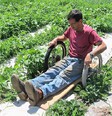AgrAbility for Africa
AgrAbility for Africa, Sonoran UCEDD (University Centers for Excellence in Developmental Disabilities -the University of Arizona), and Arizona Sonora Border Projects for Inclusion (ARSOBO) in the past weeks have been involved in talks to address disability rehabilitation care gaps that are entrenched within the African health care system that have resulted in chronic failure to support rehabilitation care and access to assistive technology for people with disabilities.
Discussions have been centered around evaluating current systems of care, and they inform the development of a comprehensive care model to meet the needs of individuals with disabilities as a way of strengthening systems. The partnership is looking at replicating the patient engagement model of ARSOBO across Africa - providing assistive technology devices made by individuals who use them, starting out in Uganda. Under the arrangement, local capacity will be developed by training local AgrAbility for Africa clients under transitional employment support, to produce wheelchairs, prosthetics, and hearing equipment that benefits their entire community. Later evaluations will have the purpose of scaling-up interventions that achieve measurable and significant health improvements in other parts of Africa.
Further, the partnership is exploring ways to increase early childhood intervention programs to address developmental disabilities. Among them is the Africa disability digital platform meant to connect families that have children with disabilities to life-changing resources, experts, and professionals around the world, enabling the entire world community to become more responsive to Africa's disability agenda and to needs in the different corners of Africa.
 In reaffirming its commitment to the disability agenda in Africa, ARSOBO will be donating three Rough Rider wheelchairs to AgrAbility for Africa, and staff are in the processing of identifying the beneficiaries according to the ARSOBO user-centered assistive technology development design process to assess their needs before the wheelchairs arrive.
In reaffirming its commitment to the disability agenda in Africa, ARSOBO will be donating three Rough Rider wheelchairs to AgrAbility for Africa, and staff are in the processing of identifying the beneficiaries according to the ARSOBO user-centered assistive technology development design process to assess their needs before the wheelchairs arrive.
 The AgrAbility for Africa staff teamed up with Ned Stoller, an assistive technology professional with the Michigan AgrAbility Project, to design and donate a Bi-Crawler to Agnes Nabawanuka in Uganda. The BiCrawler is an assistive technology device that helps people who cannot crawl or use their legs to work along the ground in fields, gardens, and flower beds. People in developing countries can sit on the platform to access latrines. It is made by welding bicycle wheels to a rebar frame with a wood platform. Click here for the BiCrawler Use demonstration.
The AgrAbility for Africa staff teamed up with Ned Stoller, an assistive technology professional with the Michigan AgrAbility Project, to design and donate a Bi-Crawler to Agnes Nabawanuka in Uganda. The BiCrawler is an assistive technology device that helps people who cannot crawl or use their legs to work along the ground in fields, gardens, and flower beds. People in developing countries can sit on the platform to access latrines. It is made by welding bicycle wheels to a rebar frame with a wood platform. Click here for the BiCrawler Use demonstration.
In efforts to advance the organization's mission to connect people with disabilities to life-changing resources, staff are seeking to catalyze significant advances in strengthening health systems by developing partnerships that will design, implement, and evaluate models of care that link implementation research and workforce training directly to the delivery of integrated primary healthcare in Uganda and other parts of Africa. The goal is to enhance the quality of rehabilitation care and support to individuals with disabilities while at the same time increasing local community knowledge and skills around evidence-based strategies for patient engagement and activation as a means of strengthening disability services and care in Africa under the community-based rehabilitation care model.
Submitted by Mutumba Faisal
